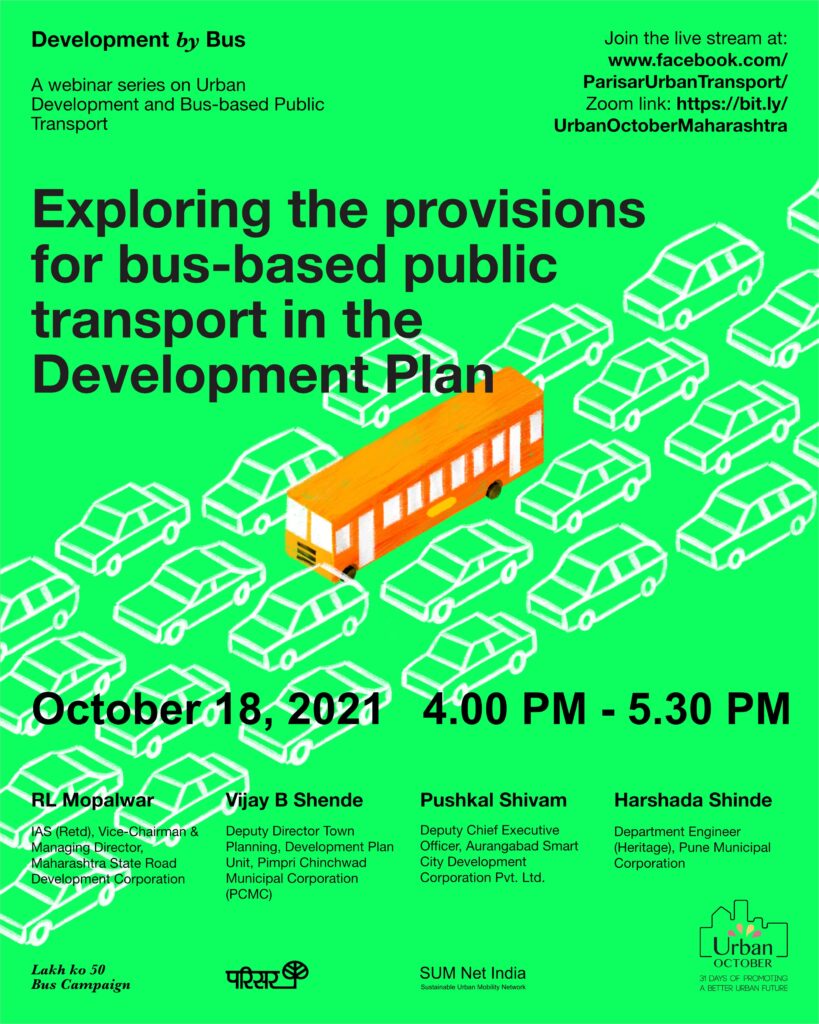City planners and officials stressed the need for clear budget allocation in Development Plans to make cities bus-friendly
The experts were speaking at a webinar to explore the link between urban development and bus transport in cities of Maharashtra.
There need to be clear norms and guidelines by the State Government for public transport, specifically to provide for the requirement of buses, such as reservations for bus depots and terminals as well as instruments for their acquisition and development, when a city’s Development Plan is being made, said key planning officials at a webinar on October 18, 2021. The panel of experts were speaking at a webinar organised by Parisar for Sustainable Urban Mobility Network’s campaign ‘Lakh ko 50’ (50 buses for every one lakh urban population) which was part of the Urban October initiative by the United Nations, and explored the bus-based public transport provisions in City Development Plans.
Harshada Shinde, executive engineer in the building department at the Pune Municipal Corporation said, “While the need for 1 bus depot for every 5 lakh population is defined, more detailed guidelines which are mandated to be followed do not exist. However, we do try to make allocations based on the needs of the city.” Deputy Director Town Planning at Pimpri-Chinchwad Municipal Corporation Mr. Shende said that norms for the development of depots need to be specified to ensure that PPP (public-private partnership) or other models help create usable, commuter-friendly depots. He cited examples, where development of some bus depots in PPP mode left very little space for the buses since commercial development took up most of the land. “There is a need to ensure that bus depots are developed in a way that gives priority to the buses and make it easy for the public to access them”, he added.
Deputy CEO of Aurangabad Smart City Development Corporation, Mr. Pushkal Shivam presented the case of Aurangabad by focusing on the Smart City Plan as part of which city bus services were started in the city under a unique Public-Public partnership model between the SPV (Special Purpose Vehicle) and the Maharashtra State Road Transport Corporation (MSRTC). “The city never developed any bus depots since there wasn’t much public transport in the past. So we have used the lands available with MSRTC to start the city’s bus service”.
While the panelists agreed that cities need a comprehensive mobility plan (CMP), again a lack of clear guidelines meant that these are not always mandatory or incorporated into the city development plan. Mrs. Shinde said that the elements of Pune’s CMP (Comprehensive Mobility Plan) are being incorporated into the new development plan being prepared for the newly merged 11 villages, but Mr. Shende admitted that not much cognizance was taken of the CMP when revising the PCMC plan. Mr. Shivam felt that, “The choice of institutional framework for running bus services is comparatively a more important concern than the need to create and implement comprehensive plans for the city. Each city has its own
history of institutional frameworks and models which must be taken into account.”

All the speakers echoed the need for clear guidelines and frameworks for decarbonising cities to be part of the DP, admitting that in the absence of such guidelines, cities try and incorporate ideas such as greening, solar power and promotion of EVs, but no formal carbon assessment and mitigation is part of the development planning process.
The webinar began with a presentation by Parisar which showed that between 2015 to 2019 the number of urban buses on the roads in the cities of Maharashtra has stagnated. Recently, the Environment Minister has pushed for reaching a target of 60 buses per lakh population (based on 2011 census data) using the funds received under the National Clear Air Programme to procure EV buses. “Such a large fleet of buses in cities needs commensurate facilities like depots and terminals which meet the need of buses and commuters”, Shri Sujit Patwardhan of Parisar said in his concluding remarks.
Swati Pathak, the campaign coordinator said, “Along with the set of recommendations identified in this webinar, Parisar will share a report on urban development and bus-based public transport to Sh. Eknath Shinde, Minister of Urban Development, Government of Maharashtra, in the coming few months.”